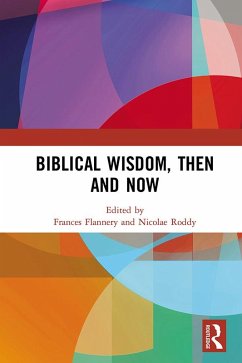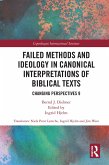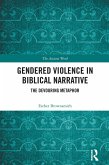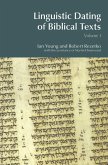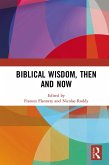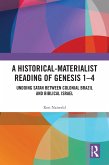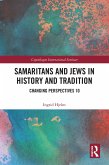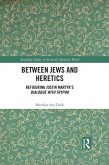Biblical Wisdom, Then and Now (eBook, PDF)
Redaktion: Flannery, Frances; Roddy, Nicolae
42,95 €
42,95 €
inkl. MwSt.
Sofort per Download lieferbar

21 °P sammeln
42,95 €
Als Download kaufen

42,95 €
inkl. MwSt.
Sofort per Download lieferbar

21 °P sammeln
Jetzt verschenken
Alle Infos zum eBook verschenken
42,95 €
inkl. MwSt.
Sofort per Download lieferbar
Alle Infos zum eBook verschenken

21 °P sammeln
Biblical Wisdom, Then and Now (eBook, PDF)
Redaktion: Flannery, Frances; Roddy, Nicolae
- Format: PDF
- Merkliste
- Auf die Merkliste
- Bewerten Bewerten
- Teilen
- Produkt teilen
- Produkterinnerung
- Produkterinnerung

Bitte loggen Sie sich zunächst in Ihr Kundenkonto ein oder registrieren Sie sich bei
bücher.de, um das eBook-Abo tolino select nutzen zu können.
Hier können Sie sich einloggen
Hier können Sie sich einloggen
Sie sind bereits eingeloggt. Klicken Sie auf 2. tolino select Abo, um fortzufahren.

Bitte loggen Sie sich zunächst in Ihr Kundenkonto ein oder registrieren Sie sich bei bücher.de, um das eBook-Abo tolino select nutzen zu können.
This volume examines biblical wisdom literature both in its historical context and as it relates to a host of contemporary themes, including overcoming social divisions, reading from a place of inclusion, healing from trauma, and challenging religious attitudes toward climate change and animals.
- Geräte: PC
- mit Kopierschutz
- eBook Hilfe
Andere Kunden interessierten sich auch für
![Failed Methods and Ideology in Canonical Interpretation of Biblical Texts (eBook, PDF) Failed Methods and Ideology in Canonical Interpretation of Biblical Texts (eBook, PDF)]() Bernd DiebnerFailed Methods and Ideology in Canonical Interpretation of Biblical Texts (eBook, PDF)42,95 €
Bernd DiebnerFailed Methods and Ideology in Canonical Interpretation of Biblical Texts (eBook, PDF)42,95 €![Gendered Violence in Biblical Narrative (eBook, PDF) Gendered Violence in Biblical Narrative (eBook, PDF)]() Esther BrownsmithGendered Violence in Biblical Narrative (eBook, PDF)42,95 €
Esther BrownsmithGendered Violence in Biblical Narrative (eBook, PDF)42,95 €![Linguistic Dating of Biblical Texts: Vol 1 (eBook, PDF) Linguistic Dating of Biblical Texts: Vol 1 (eBook, PDF)]() Ian YoungLinguistic Dating of Biblical Texts: Vol 1 (eBook, PDF)43,95 €
Ian YoungLinguistic Dating of Biblical Texts: Vol 1 (eBook, PDF)43,95 €![Biblical Wisdom, Then and Now (eBook, ePUB) Biblical Wisdom, Then and Now (eBook, ePUB)]() Biblical Wisdom, Then and Now (eBook, ePUB)42,95 €
Biblical Wisdom, Then and Now (eBook, ePUB)42,95 €![A Historical-Materialist Reading of Genesis 1-4 (eBook, PDF) A Historical-Materialist Reading of Genesis 1-4 (eBook, PDF)]() Ron NaiweldA Historical-Materialist Reading of Genesis 1-4 (eBook, PDF)43,95 €
Ron NaiweldA Historical-Materialist Reading of Genesis 1-4 (eBook, PDF)43,95 €![Samaritans and Jews in History and Tradition (eBook, PDF) Samaritans and Jews in History and Tradition (eBook, PDF)]() Ingrid HjelmSamaritans and Jews in History and Tradition (eBook, PDF)42,95 €
Ingrid HjelmSamaritans and Jews in History and Tradition (eBook, PDF)42,95 €![Between Jews and Heretics (eBook, PDF) Between Jews and Heretics (eBook, PDF)]() Matthijs Den DulkBetween Jews and Heretics (eBook, PDF)0,00 €
Matthijs Den DulkBetween Jews and Heretics (eBook, PDF)0,00 €-
-
-
This volume examines biblical wisdom literature both in its historical context and as it relates to a host of contemporary themes, including overcoming social divisions, reading from a place of inclusion, healing from trauma, and challenging religious attitudes toward climate change and animals.
Dieser Download kann aus rechtlichen Gründen nur mit Rechnungsadresse in A, B, BG, CY, CZ, D, DK, EW, E, FIN, F, GR, HR, H, IRL, I, LT, L, LR, M, NL, PL, P, R, S, SLO, SK ausgeliefert werden.
Produktdetails
- Produktdetails
- Verlag: Taylor & Francis eBooks
- Seitenzahl: 200
- Erscheinungstermin: 29. Juli 2021
- Englisch
- ISBN-13: 9781000414936
- Artikelnr.: 62057045
- Verlag: Taylor & Francis eBooks
- Seitenzahl: 200
- Erscheinungstermin: 29. Juli 2021
- Englisch
- ISBN-13: 9781000414936
- Artikelnr.: 62057045
- Herstellerkennzeichnung Die Herstellerinformationen sind derzeit nicht verfügbar.
Frances Flannery is Professor of Religion at James Madison University, Harrisonburg, Virginia, USA. She teaches courses in biblical studies, religion and culture, and intelligence analysis. She is a specialist in the intersection of biblical studies and contemporary challenges, especially as concerns climate change, violent extremism, peacebuilding, and intergroup dialogue. She has authored two monographs (Dreamers, Scribes and Priests: Jewish Dreams in the Hellenistic and Roman Eras, 2004; Understanding Apocalyptic Terrorism: Countering the Radical Mindset, Routledge, 2016), two other edited volumes (The Bible and Political Debate: What Does it Really Say?, 2016; Experientia, Volume One: Inquiry into Religious Experience in Early Judaism and Christianity, 2008), and over fifty peer-reviewed articles or chapters. Nicolae Roddy is Professor of Theology at Creighton University, Omaha, Nebraska, USA. An Eastern (Romanian) Orthodox biblical scholar, Roddy teaches Hebrew Bible / Older Testament courses, as well as early Jewish and Christian history in Creighton's Honors program. Roddy is a former Fulbright scholar to Romania. He currently serves as Visiting Professor for the Jewish Studies Center in the Faculty of Letters at the University of Bucharest, teaching ancient Jewish history and biblical archaeology. For twenty years, Dr. Roddy served as co-director and area supervisor for the Bethsaida Archaeology project. He is author of The Romanian Version of the Testament of Abraham: Text, Translation, and Cultural Context (2001) and three edited volumes, as well as numerous peer-reviewed book chapters, articles, and archaeological reports.
List of contributors; Abbreviations; Foreword by Alan J. Hauser; Preface by Frances Flannery; Introduction and Case Study
"Wisdom for Challenging Times: Ecclesiastes
Job
and a Vote for Compassionate Theology"
Nicolae Roddy and Frances Flannery; PART ONE. The Wisdom Tradition Then; Chapter 1
Wisdom for the Exiled: An Intertextual Approach
Katharine J. Dell; Chapter 2
Wisdom for the Scribe: Ritual and the Life of the Scribe in Sirach
Rodney A. Werline; Chapter 3
Wisdom for the King: Wisdom for Rulers through History
Lowell K. Handy; PART TWO. The Wisdom Tradition Now; Chapter 4
Wisdom for Those in the Image of God: An Eco-Theological Reading of Human and Serpentine Knowledge in Genesis 1-3
Frances Flannery; Chapter 5
Wisdom for Evangelical Christians: Reading the Bible Wisely in Relation to Climate Change
Chris VanLandingham; Chapter 6
Wisdom for the Animals and the Cosmos: The Psalms and Anthropocentric Religion
Iain Provan; Chapter 7
Wisdom for the Silenced: Reading Psalm 32 as Cautionary Counsel in Response to 2 Samuel 13-19
Charles A. Packer; Chapter 8
Wisdom for All: Reading the Liberating "I" of the Psalms
Beth LaNeel Tanner; Chapter 9
Wisdom for the Imagination: Hammering Heaven in William Blake's Illuminated Books
Rachel Wagner; Chapter 10
Wisdom for Haters: Biblical Wisdom as an Antidote to Othering
Nicolae Roddy; Index
"Wisdom for Challenging Times: Ecclesiastes
Job
and a Vote for Compassionate Theology"
Nicolae Roddy and Frances Flannery; PART ONE. The Wisdom Tradition Then; Chapter 1
Wisdom for the Exiled: An Intertextual Approach
Katharine J. Dell; Chapter 2
Wisdom for the Scribe: Ritual and the Life of the Scribe in Sirach
Rodney A. Werline; Chapter 3
Wisdom for the King: Wisdom for Rulers through History
Lowell K. Handy; PART TWO. The Wisdom Tradition Now; Chapter 4
Wisdom for Those in the Image of God: An Eco-Theological Reading of Human and Serpentine Knowledge in Genesis 1-3
Frances Flannery; Chapter 5
Wisdom for Evangelical Christians: Reading the Bible Wisely in Relation to Climate Change
Chris VanLandingham; Chapter 6
Wisdom for the Animals and the Cosmos: The Psalms and Anthropocentric Religion
Iain Provan; Chapter 7
Wisdom for the Silenced: Reading Psalm 32 as Cautionary Counsel in Response to 2 Samuel 13-19
Charles A. Packer; Chapter 8
Wisdom for All: Reading the Liberating "I" of the Psalms
Beth LaNeel Tanner; Chapter 9
Wisdom for the Imagination: Hammering Heaven in William Blake's Illuminated Books
Rachel Wagner; Chapter 10
Wisdom for Haters: Biblical Wisdom as an Antidote to Othering
Nicolae Roddy; Index
List of contributors; Abbreviations; Foreword by Alan J. Hauser; Preface by Frances Flannery; Introduction and Case Study
"Wisdom for Challenging Times: Ecclesiastes
Job
and a Vote for Compassionate Theology"
Nicolae Roddy and Frances Flannery; PART ONE. The Wisdom Tradition Then; Chapter 1
Wisdom for the Exiled: An Intertextual Approach
Katharine J. Dell; Chapter 2
Wisdom for the Scribe: Ritual and the Life of the Scribe in Sirach
Rodney A. Werline; Chapter 3
Wisdom for the King: Wisdom for Rulers through History
Lowell K. Handy; PART TWO. The Wisdom Tradition Now; Chapter 4
Wisdom for Those in the Image of God: An Eco-Theological Reading of Human and Serpentine Knowledge in Genesis 1-3
Frances Flannery; Chapter 5
Wisdom for Evangelical Christians: Reading the Bible Wisely in Relation to Climate Change
Chris VanLandingham; Chapter 6
Wisdom for the Animals and the Cosmos: The Psalms and Anthropocentric Religion
Iain Provan; Chapter 7
Wisdom for the Silenced: Reading Psalm 32 as Cautionary Counsel in Response to 2 Samuel 13-19
Charles A. Packer; Chapter 8
Wisdom for All: Reading the Liberating "I" of the Psalms
Beth LaNeel Tanner; Chapter 9
Wisdom for the Imagination: Hammering Heaven in William Blake's Illuminated Books
Rachel Wagner; Chapter 10
Wisdom for Haters: Biblical Wisdom as an Antidote to Othering
Nicolae Roddy; Index
"Wisdom for Challenging Times: Ecclesiastes
Job
and a Vote for Compassionate Theology"
Nicolae Roddy and Frances Flannery; PART ONE. The Wisdom Tradition Then; Chapter 1
Wisdom for the Exiled: An Intertextual Approach
Katharine J. Dell; Chapter 2
Wisdom for the Scribe: Ritual and the Life of the Scribe in Sirach
Rodney A. Werline; Chapter 3
Wisdom for the King: Wisdom for Rulers through History
Lowell K. Handy; PART TWO. The Wisdom Tradition Now; Chapter 4
Wisdom for Those in the Image of God: An Eco-Theological Reading of Human and Serpentine Knowledge in Genesis 1-3
Frances Flannery; Chapter 5
Wisdom for Evangelical Christians: Reading the Bible Wisely in Relation to Climate Change
Chris VanLandingham; Chapter 6
Wisdom for the Animals and the Cosmos: The Psalms and Anthropocentric Religion
Iain Provan; Chapter 7
Wisdom for the Silenced: Reading Psalm 32 as Cautionary Counsel in Response to 2 Samuel 13-19
Charles A. Packer; Chapter 8
Wisdom for All: Reading the Liberating "I" of the Psalms
Beth LaNeel Tanner; Chapter 9
Wisdom for the Imagination: Hammering Heaven in William Blake's Illuminated Books
Rachel Wagner; Chapter 10
Wisdom for Haters: Biblical Wisdom as an Antidote to Othering
Nicolae Roddy; Index
